http://www.globalresearch.ca/PrintArticle.php?articleId=2854

By Mahdi Darius Nazemroaya
Global Research, July 29, 2006
The Russian Federation and Venezuela on July 27, 2006 have negotiated and approved the sale of 24 aircraft and 53 helicopters—about a $1 billion (U.S.) deal—to Venezuela, as part of an ongoing landmark event, defying the American threats and demands to halt all weapons transfers and any future deals between Russia and Venezuela. Russia has already supplied and started delivering portions of a 100,000 Kalashnikov automatic rifles ordered by Venezuela and Russian attack helicopters to Venezuela. This deal has further entrenched Russian-Venezuelan cooperation, partnership, and the strategic shift of Russia replacing the United States as the military hardware supplier of Venezuela. The securing of this military hardware agreement between Russia and Venezuela is a sign of the fermenting geo-strategic confrontation or rivalry between the Russia and the United States.
The United States slapped the weapons embargo onto Venezuela referring as justification to the strategic partnerships and alliances of Venezuela with Iran and Cuba. The U.S. weapons embargo on Venezuela started in May, 2006, and has including the U.S. putting pressure on Spain and Brazil to halt their agreements to supply military equipment to Venezuela. Venezuela has responded that the U.S. embargo is illegitimate in violation of previous agreements between Venezuela and the United States, and based on a premise for an American offensive against Venezuela.
Venezuelan Army and Naval aircraft are almost all totally American manufactured, while the Venezuelan Air Force, with the most significant air fleet out of the three forces, had 177 U.S. manufactured aircraft out of a total fleet of 277 aircraft prior to the major military purchases from Russia. Venezuela has traditionally purchased its weaponry from the United States. Venezuela in 2005, alone, purchased about $34 (U.S.) million worth of U.S. military equipment. It is significant to note that just $30.5 (U.S.) million of these purchases were C-130 cargo plane spare parts.
The American embargo seems to be a deliberate tactic that is part of strategy to disarm Venezuela, a notable source of fossil fuels and an influential state in Latin America and the Caribbean. The Venezuelan military’s F-5 Freedom Fighters, F-16 Falcons, C-130 cargo planes and American attack helicopters would for all practical purposes eventually be neutralized. That is why Venezuela immediately sought other defence manufacturers, which ultimately resulted in Russia replacing the United States in equipping the Venezuelan military.
Possible Transfer of Venezuelan F-16 Falcon Squadron to Iran
What is interesting is that in response to the U.S. weapons embargo on Venezuela, the Venezuelan government has declared that it is considering transferring Venezuela’s F-16 Falcon squadron and other U.S. manufactured military aircraft to the Iranian military. The United States blasted the Venezuelan idea saying that based on the 1982 sale and deal between the United States and Venezuela for the F-16 Falcons Venezuela could not sell the planes to a third party, in this case Iran, without U.S. approval, which the United States would definitely not give.
The Venezuelan government maintained that the sale of the F-16 Falcon squadron is perfectly possible because the United States had violated and breached the contract by not honouring the obligation of supplying Venezuela the aircraft parts that Venezuela has paid for and as agreed upon purchase by Venezuela and the United States.
The sale has been deemed by Western analysts to give no significant tactical benefit to Iran because of the fact that Iran is also under an American embargo and has no access to the spare parts needed to keep the aircraft operational, but then again the Iranian military has been reported to have successfully reengineered old American military hardware and is highly secretive. President Hugo Chavez is due in Tehran, Iran and Venezuela might just sell portions of their U.S. manufactured aircraft that are being replaced with Russian manufactured aircraft to Iran.
The Venezuelan government has rapidly been shifting all its links and reliance away from the United States, all but the export of oil to the thirsting U.S. market which has also been outlined as an eventual strategic goal for Venezuela too. Deals have been negotiated for industrial and energy projects with both Russia and Iran. The rerouting of Venezuelan oil from the United States to China has been envisioned as part of the ultimate goal of Venezuela as a member of a solidifying energy alliance between Venezuela, Russia, and Iran. This is why the United States has tagged President Hugo Chavez and the Venezuelan government as a threat to American energy security. As a result relations between Venezuela and the United States have been deteriorating.
During February, 2005 the Venezuelan government publicly accused the U.S. government of plotting to assassinate President Chavez, something that the Venezuelan media has reported that the U.S. Ambassador to Venezuela admitted the U.S. government was aware of, but not a party too.
In Russia, during his July meetings, the Venezuelan President Hugo Chavez triumphantly declared to the media that when the American blockade was imposed to weaken Venezuela for eventual U.S. invasion the Russian government had offered support to Venezuela. President Chavez and the Venezuelan government have clearly articulated that they are preparing the Venezuelan military to repel U.S. aggression, which is a widely held belief throughout Venezuela and neighboring Columbia. In Argentina, during the Summit of the Americas, President Chavez even told thousands of sympathetic Latin American demonstrators that U.S. plans to invade Venezuela in are in full preparation.
A statement released on March 8, 2005 and signed by almost 400 Venezuelan journalists accused the U.S. government and media of a campaign to prepare the basis for a U.S. military attack on Venezuela to control it natural resources, namely oil. Tensions were further heightened when Venezuela detected the secret presence of “US Marines, along with military planes and amphibious vehicles” on the Caribbean island of Curacao, part of the Dutch Antilles, just 75 km from the Venezuelan mainland during March, 2006, which the U.S. Ambassador in Caracas apologized for as a “lack of communication” between the Venezuelan and American governments.
Since the start of 2005, Venezuela has laid the strategic foundations of a new national security doctrine and an expanded military capability that is based on the core assumption that the greatest threat to Venezuelan sovereignty is the United States. Venezuela has also created a military reserve program that is projected to mobilize 2.6 million citizens in the defence of Venezuela from an American attack.
The Venezuelan national security doctrine, much like the Cuban national security doctrine, is primarily designed to oppose the anticipated U.S. military invasion is an asymmetrical war. Besides the expected U.S. military invasion, the Venezuelan national security doctrine has been drafted to meet a U.S. contrived war with Colombia, and internal armed insurgency sponsored by the United States. A mutual defence pact with Cuba has also been integrated into the Venezuelan national security doctrine and Venezuela has created special police, military, and elite paramilitary groups that operate independently from the regular command of the Venezuelan military.
http://news.bbc.co.uk/2/hi/americas/7602530.stm
BBC, Sunday, 7 September 2008 04:18 UK
Venezuela says it plans to hold joint naval exercises in its territorial waters with Russian forces in November.
A senior Venezuelan naval officer said four Russian ships would take part in the exercises, which would also involve Venezuelan aircraft and submarines.
Correspondents say the move is likely to raise concern in the US, whose relations with Russia have been soured by Moscow's recent conflict in Georgia.
Washington already has rocky relations with Venezuela's President Hugo Chavez.
In July, he called for a strategic alliance with Russia to protect Venezuela from the US.
Caracas and Moscow agreed to extend bilateral co-operation on energy, with three Russian energy companies to be allowed to operate in Venezuela.
Regional first
On Saturday, Venezuela's Rear Admiral Salbatore Cammarata Bastidas said four Russian ships and 1,000 Russian troops would take part in exercises in Venezuelan territorial waters from 10 to 14 November.
"This is of great importance because it is the first time it is being done (in the Americas)," he said in a statement quoted by the AFP news agency and local media.
President Chavez supported Russia's intervention in Georgia last month and has accused Washington of being scared of Moscow's "new world potential".
Earlier, US Vice-President Dick Cheney launched a furious attack on Russia over the recent conflict in the Caucasus.
Mr Cheney described Moscow's actions against Georgia as an affront to civilised standards and said it was reverting back to old Soviet tactics of intimidation and the use of brute force.
He added that Russia was also seeking to use its energy resources as a weapon.
Et bien entendu, Moscou n'hésite plus à renforcer ses liens avec Pékin. Car il n'y a plus les conflits idéologiques & territoriaux de la fin des années 1980. On espérait la paix, Washington nous prépare la guerre. Wall Street ne finissant pas de s'effondrer, lentement mais sûrement, ces fous n'hésiteront pas un seul instant à la faire éclater sur toute la planète.
http://www.atimes.com/atimes/China/JI06Ad01.html

Greater China
Sep 6, 2008
China still on-side with Russia
By Yu Bin
Sino-Russian relations have been under intense scrutiny lately because of the Georgian-Russian conflict over the breakaway Georgian
region of South Ossetia. For many in the West, China's cautious "neutrality" is a departure from, if not a betrayal of, its strategic partnership with Russia.
Such a view, among others, misreads the state of the Sino-Russian relationship without an adequate understanding of its depth, breadth and complexity. As a result, the Western perception of Beijing-Moscow ties has swung from one of threat against the West prior to
the South Ossetia crisis to the current premature celebration of its
obituary.
Neither is right. Both look at the superficiality while ignoring the substance. With the looming confrontation between Washington and Moscow over South Ossetia, the West itself seems to be getting lost in its tireless effort to renew the "Western civil war", which was said to have ended in 1991 when the Soviet Union collapsed.
South Ossetia and China's 'strategic ambiguity'
In the early morning of August 8, 2008, when President Dmitry Medvedev was on vacation and Prime Minister Vladimir Putin was in
Beijing attending the Summer Olympics Games, Georgia launched a military offensive to surround and capture Tskhinvali, the capital of South Ossetia.
Putin, who was in Beijing prior to the Olympics opening ceremony, immediately informed the Chinese side in his meeting with Premier
Wen Jiabao on August 8. China's reaction to Georgia's assault, according to Putin, was that "nobody needs the war", which was also US President George W Bush's reaction.
Meanwhile, China expressed serious concern over the escalated tensions and armed conflict in South Ossetia, and urged both sides
to exercise restraint, cease fire immediately and resolve their dispute peacefully through dialogue. In a way, Beijing did not publicly and explicitly support Moscow.
China's "strategic ambiguity", if not neutrality, regarding the Georgia-Russian conflict has been the focus of the media and pundits. Many tend to highlight the differences and conflicts of interest between China and Russia. China's move is seen as an effort to maximize its interests while Russia is going through difficult times with the West. China's own Taiwan problem is perhaps one major reason that China cannot publicly support Russia over this issue.
Most Central Asian states are also said to have reservations regarding Russia's policy, due to the large number of ethnic
Russians living in this "near abroad" area and their "cautious neutrality" also shows the growing influence of China in this traditional sphere of influence of the Russians.
These apparent differences between Russia and its Shanghai Cooperation Organization (SCO) partners - China, Kazakhstan, Kyrgyzstan, Tajikistan and Uzbekistan - are indications of the fragility of this regional security group, and many of its members simply dream different dreams while sleeping on the same bed with Moscow. Last if not least, Georgia lost no time in thanking China for not taking sides.
These assessments, among others, may make some sense.
There is, nonetheless a discernible switch in the West from exaggerating the strength, or threat, of the Sino-Russian strategic partnership to one of overplaying their differences, deliberately or not.
Both views are rooted in a misperception of the Beijing-Moscow strategic partnership, which essentially means a normal
relationship. It is the result of a long and sometimes painful learning experience in the second half of the 20th century - in which relations between Moscow and Beijing oscillated between excessive dependence (particularly China on Russia) and almost zero interactions.
What is essential for today's Russian-China relationship is the absence of the ideological factors and border disputes that
constantly besieged the two nations up to the early 1990s. On the
operational level, it means that the two sides attach great importance to bilateral ties and share a strong willingness to commit to their enhancement. At the operational and functional level, it is largely a pragmatic approach "to conduct strategic coordination without alliance and close relationship without excessive dependence". Moreover, there is a willingness to develop the more cooperative aspects of their relationship while managing those of disagreement and competition.
It is within this context of normal relationship, not one of alliance, that China reacts to the Georgian-Russian conflict. (In terms of trade, bilateral trade between China and Russia, which has been growing at an average 30% pace annually over the past nine years, may reach US$50 billion in 2008, according to Gao Hucheng, Chinese vice minister of commerce. Bilateral trade hit $32.3 billion, up 29% year-on-year, in the January-July period of this year.)
'West's civil war' again? Stupid
In a broader sense, China's "harmonious world" means stability of the existing international system, despite the fact that it is
dominated by the West. Indeed, China would like to see, as much as the West would, the stability and continuity of the existing international system, from which China has benefited enormously.
The Georgian-Russian conflict is in essence between Russia and the US. While finger-pointing was hurled between Moscow, Washington and
Tbilisi regarding who made the first move, it is inconceivable that a small Georgia would dare to take on its giant neighbor without explicit support from Washington.
Indeed, Washington was not only aware of Georgian military actions before they started, it also explicitly sided with Tbilisi for the
August surprise, which may have contributed to Saakashvili's recklessness and miscalculation. Whether the world is heading back to the Cold War or pre-World War I setting, the ghost of "Western civil war", which was claimed to have come to an end with the collapse of the former Soviet Union in 1991, is being rekindled by the Georgian/US-Russian conflict. Given this specter of a possible general instability of the international system, Beijing's cautious approach is perhaps quite natural.
Beijing's public "neutrality" toward the Georgia-Russian conflict, however, should not be a surprise in that it has been the pattern
in China's diplomacy since the 1980s. In almost all cases ranging from international crises (Korean Peninsula, Iran, Kashmir, etc) to bilateral disputes (the South China Sea with the Association of Southeast Asian Nations, the East China Sea with Japan, border settlements with Russia, Vietnam, India - in progress- etc), China has opted for dialogue and compromise, rather than confrontation or side-taking. The same operational principle has applied to difficult issues such as Hong Kong and Taiwan.
Aside from this predictable pattern of China's approach to conflict and disputes, the timing of the conflict was also an irritant for
Beijing. China did not want any conflict at the historical moment of hosting the Olympics, whether Russia was part of the conflict or not. Given the complexities of the ethnic conflicts dating back to the 1920s, its evolving nature and the US looming large in the background, China's cautious reaction was expected, if not desirable for Moscow.
SCO sounds no SOS
During the SCO's annual regular summit on August 28, in Dushanbe, Tajikistan, Medvedev briefed the SCO heads of state on the
Georgian-Russian conflict and Russian policies. The Dushanbe Declaration does support Moscow's six principles of settling the conflict in South Ossetia and supports Russia's "active role" in promoting peace and cooperation in the region. The wording of its call for peaceful negotiations of the conflict, however, is vague and general at best.
The reason for the SCO's "neutrality" is both complicated and simple, complicated in that all of the SCO's Central Asian states were former Soviet republics. Many, if not all, of them do not want to see any replay of the Georgian-Russian conflict in their part of the world. That concern of the Central Asian states, however, remains a distant possibility, given that the SCO provides a framework for its members to resolve disputes and to achieve common purposes of security and development.
The key to the SCO's stance, however, lies in the nature and structure of the regional security group. Far from becoming a military bloc, like the North Atlantic Treaty Organization (NATO), in which members are obligated to defend one another, the SCO is a huge and diverse community of nations with considerable space for individual members to pursue their own policies for their own interests.
There is simply no obligation for SCO members to automatically commit themselves the way members of typical military alliances would do. Given these reasons, Medvedev perhaps never explicitly
asked or demanded public support from the SCO members.
Under these circumstances, the SCO's joint Dushanbe Declaration actually means quite a lot for the Russians, particularly in Article 3: "The SCO welcomes the approval on 12 August 2008 in Moscow of the six principles of settling the conflict in South Ossetia, and supports the active role of Russia in promoting peace and cooperation in the region." The member states of the SCO also "express their deep concern" over the tension around the issue of South Ossetia and call for peaceful means through dialogue for reconciliation and facilitation of negotiations.
This can be seen as directed to both sides, particularly Georgia, which started the ball rolling on August 8.
China back to its past, for the future
Last if not least, what China did was perhaps rational within the context of its strategic partnership relations with Russia. It is
perhaps what Russia would do in a scenario of a China-US conflict over Taiwan. That is, Russia would more likely remain neutral though expressing sympathy for China. This was exactly what Moscow did in 2001 when a US spy plane (EP-3) collided with a Chinese jet fighter (J-8II) off China's coast, leading to a major crisis between China and the US.
Even if the Russians did not get all of what they wanted from China and the SCO summit, this is by no means the beginning of the end
of their strategic partnership. Over the past 30 years, China's diplomacy, particularly its relations with Russia, has become far more sophisticated, nuanced, measured and matured.
To a large extent, China's foreign policy has gone back to
its deeper philosophical underpinnings of "unity, harmony with or without uniformity" ( he er bu tong). This is also one of the psychological anchors for the Sino-Russian strategic partnership after the two extreme types of relationship of "honeymoon" (1950s) and "divorce" (1960s and 1970s) between Beijing and Moscow.
Western perceptions and expectations that Beijing and Moscow are heading toward some sort of "separation" are, therefore, an
overstatement at best. It is also largely derived from the West's own experience and practice, which insists on unity because of (or by, of and for) uniformity. Hence, NATO members must be democracies and the European Union must be European, Christian and perhaps white. Applying the same "recipe" to the SCO and recent Sino-Russian relations, which have largely transcended the past practice of alliances, may lead to nowhere.
'Splendid isolation' in the 21st century
When the Georgian dust settles, the West may start to comprehend that the Sino-Russian strategic partnership is perhaps not as
strong or weak as it appears. What is unclear, however, is whether the crisis between Washington and Moscow will be over, as Washington has rushed US$1 billion aid, and Vice President Dick Cheney, to Georgia and NATO is amassing warships in the Black Sea.
The US presidential candidates, too, are rushing to demonize Russia and glorify Georgia as if there is no tomorrow. If this continues, the "Western civil war" may well turn into a brave new page for
the 21st century focusing on Russia as the problem.
The irony is that Russia has wanted to rejoin the West over the past 20 years and is in no mood to confront the West. Each time, however, its unrequited affection of the West has led to dismay. Soon after
assuming his presidency, Medvedev unleashed in Berlin his grand blueprint for a Euro-Atlantic community from Vancouver to Vladivostok. Within this community, Russia and Europe were said to share common roots, history, values and thinking. A month later, the Russian president again tossed around the same "Medvedev doctrine" at the Group of Eight summit in Japan.
On the same day, however, US Secretary of State Condoleezza Rice and the Czech Republic signed a missile defense agreement, to the dismay of Moscow.
Putin, too, began his presidency with an unambiguous Westpolitik (visiting Britain for his first foreign tour as Russian president, toyed with a "hypothetical" idea of Russia joining NATO, and
"confessed" to the visiting Rice his "European essence" and his Asian superficiality of practicing judo and eating Chinese food). Over time, however, Putin became increasingly Euro-Asian.
Even Boris Yeltsin, father of the Russian Federation,began with an obsession of Western-style political democratization and economic shock therapy. Prior to his sudden exit from power at the end of
1999, Yeltsin chose Beijing to remind the West of Russia's huge nuclear arsenal, in a manner more like a recidivist Soviet premier. In between, the man who brought down the Soviet empire became progressively more disillusioned with the West.
It is time for the West to reflect on its current Ostpolitik (missile defense, NATO expansion, etc), not necessarily for the
West's own interests, but the human race as a whole. The alternative is to stay the course in making Russia a problem for the 21st century. A key difference between this newfound obsession of the West and past stages of the Western civil war is that the world is now in an era of weapons of mass destruction.
Already, pundits are talking about possible mushroom clouds for World War III if Russia's rusted conventional military hardware fails to deter the other side. This scenario, no matter how distant, remains a possibility, which is qualitatively different from its predecessors of the 19th century when the West dealt with the French problem (the Napoleon Wars) and of the 20th century for the German problem (World War I and II). The latter sucked the whole world into West's own senseless mutual slaughtering.
If this remains a possibility, China, together with the rest of the non-Western world, will be better off staying out.
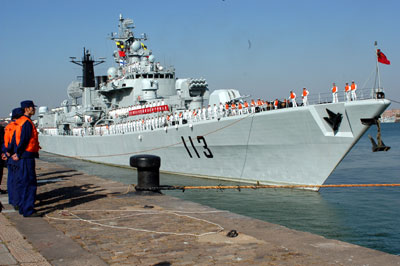
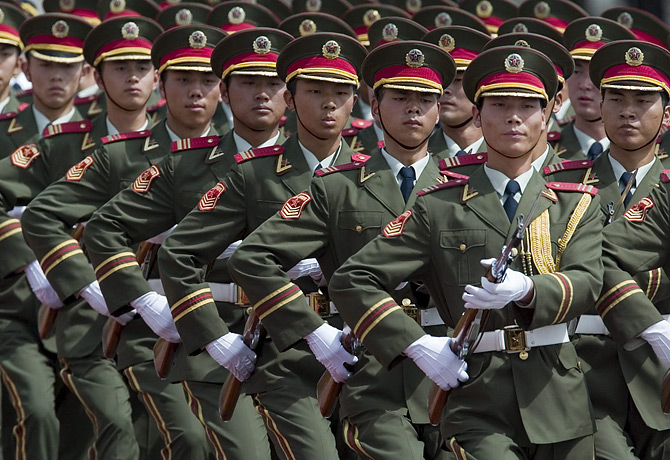
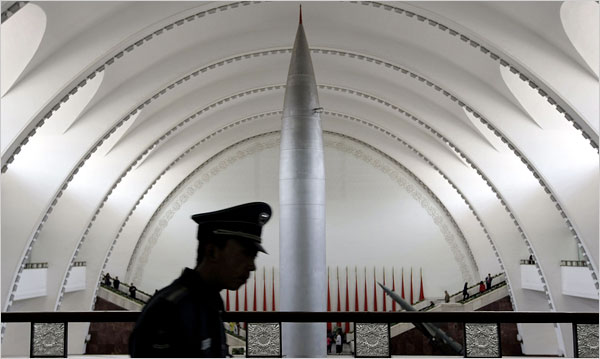
A force de chatouiller le dragon chinois, après avoir planté des banderilles dans le dos de l'ours moscovite, Washington va avoir ces 2 grandes puissances nucléaires en opposition militaire directe. Et l'Inde ne prendra pas le parti des Américains. Ils sont fous, ces monstres.

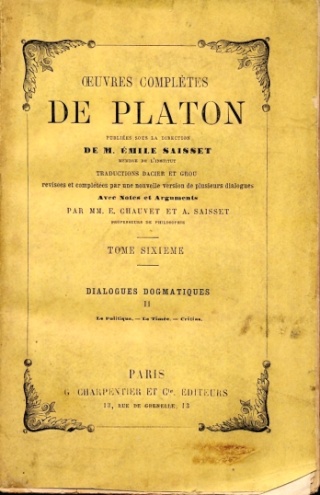


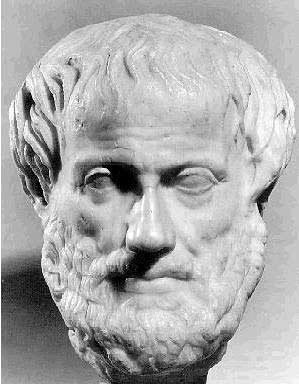
Aucun commentaire:
Enregistrer un commentaire